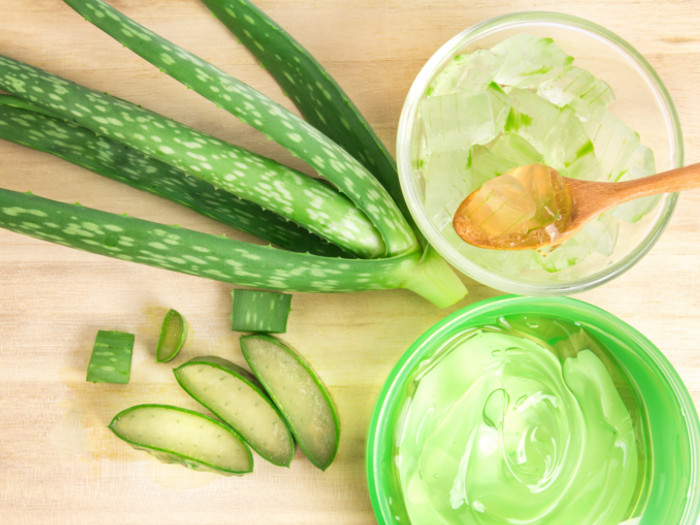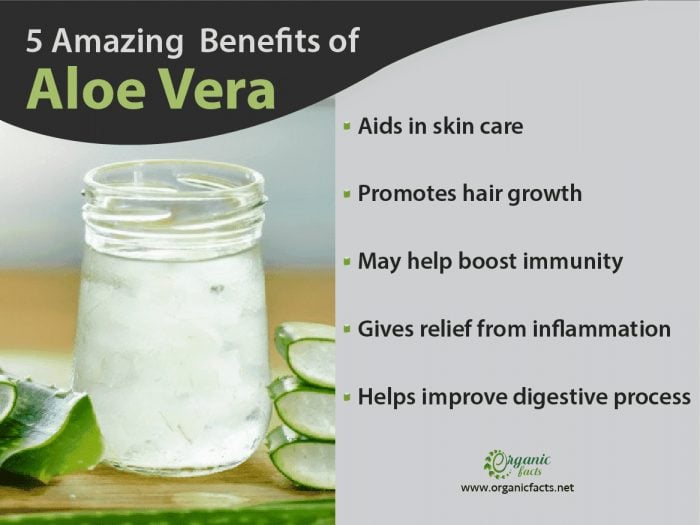The health benefits of aloe vera include strengthening the immune system, reducing arthritis pain, and healing wounds. It also helps lower blood sugar, helps fight oxidative stress, and heal the side effects of radiotherapy treatments. Aloe vera has long been used for skin conditions like sunburns, acne, and dermatitis, due to its rich antioxidant properties.
Table of Contents
What is Aloe Vera?
Aloe vera is a short shrub that is known widely for its medicinal properties. The other common names of aloe are lily of the desert, burn plant, and elephant’s gall. It belongs to the family of succulent plants in the genus ‘Aloe’. It grows best in warm and dry climates and is densely found in India, Africa, and other arid zones. [14]
Aloe vera plant is often a stemless or sometimes very short-stemmed juicy plant that grows around 60–100 cm (24–39 inch) in height and its offsets spread out wide. The leaves of this plant are thick and fleshy and the color varies from green to gray-green. Some varieties of this plant have white flecks on the upper and lower portions of the stem surfaces. The margin of the leaves is like saw-tooth and the flowers bloom during the summer. This plant can be easily grown both, indoors and outdoors.
Aloe Vera Uses
Aloe vera is a succulent plant with many amazing uses, and its benefits are typically obtained by breaking off a stalk to extract the gel-like substance within.
- Aloe vera gel can be topically applied to your skin, hair, and wounds. Learn the recipe for aloe vera gel in our article – How To Make Aloe Vera Gel From Fresh Aloe Vera Leaves.
- Aloe vera juice is also used as a traditional remedy for scalp care and dandruff. You can read more about it here – Aloe Vera Juice For Hair: Top Benefits & How To Use. To learn how to make aloe vera juice – read this – Homemade Aloe Vera Juice Recipe. It also has many other amazing health benefits, which you can read here – 7 Surprising Benefits Of Aloe Vera Juice.
- While many people think aloe vera juice and aloe water are the same things – we can tell you they are not. Click here to know what aloe water is and how it helps – What Is Aloe Water?
- Aloe vera oil is another way to use this plant for its amazing health benefits. To understand more about – 11 Best Benefits And Uses Of Aloe Vera Oil.
- Do you know that the sap of this plant is also used to make tea? Aloe vera tea is rich in antioxidants and comes with many amazing benefits – read the full article here – Amazing Benefits Of Drinking Aloe Vera Tea.
- Many people use this plan to make some amazing smoothies.
- If you are unable to get fresh aloe, then you can look for aloe vera powder or extracts.

Aloe vera is rich in antioxidants and helps in boosting immunity. Photo Credit: Shutterstock
| Serving Size : | |
|---|---|
| Nutrient | Value |
| Water [g] | 96.23 |
| Energy | 15 |
| Energy [kJ] | 61 |
| Ash [g] | 0.02 |
| Carbohydrate, by difference [g] | 3.75 |
| Sugars, total including NLEA [g] | 3.75 |
| Calcium, Ca [mg] | 8 |
| Iron, Fe [mg] | 0.15 |
| Sodium, Na [mg] | 8 |
| Vitamin C, total ascorbic acid [mg] | 3.8 |
| Sources include : USDA [15] | |
Aloe Vera Nutrition
Aloe vera is a nutrient-powerhouse. It contains about 75 active ingredients like minerals, sugars, vitamins, enzymes, salicylic acids, and also amino acids. In terms of vitamins, aloe contains vitamins A, C E, and B12. Moreover, it is also rich in folic acid and choline. The mineral wealth in aloe contains calcium, potassium, zinc, chromium, copper, selenium, magnesium, manganese, and sodium. It also contains glucose and fructose. [16]
Aloe is also a residence to some incredibly amazing phenolic compounds like anthraquinones.
Aloe Vera Benefits
The health benefits of aloe are discussed below.
Rich in Antioxidants
A 2008 study suggests that aloe vera has antioxidant, antiviral, and antitumor properties that help to stimulate the immune system. It helps to protect you from various diseases like herpes simplex, varicella-zoster, and even influenza. [17]
Beverages made with aloe vera juice possess natural detoxifying properties that effectively cleanse the digestive system and the circulatory system. As the absorption level of nutrients accelerates, it results in better blood circulation and also improves health. When the blood is oxygen-rich, it automatically provides antioxidants within the cells more proficiently. These healthy cells ensure your body’s ability to ward off infections, thereby strengthening your immune system. It has the capability to neutralize harmful bacteria and its rejuvenating properties work within your body to keep you fresh and active throughout the day. [18] [19]
Improves Digestion
Dr. Meika Foster, University of Sydney, Australia, in her study reports that aloe vera has amazing laxative effects. Thus, it helps to treat irritable bowel syndrome (IBS) and keeps constipation, piles, and other gastrointestinal conditions from damaging your system. [20]
Aloe vera has compounds called polysaccharides that have the ability to cure a host of digestive disorders and ulcers. Ulcers are one of the most prominent consequences of digestive problems that are effectively cured by this plant extract. Many studies have proven that it counteracts issues like peptic ulcers, and other digestive tract disorders. If you suffer from ulcers and consume aloe vera extract for at least 3-4 weeks, you will surely notice positive results. [21]
As per another study published in Elsevier’s Journal of Traditional Chinese Medicine, aloe vera can provide an effective treatment against gastroesophageal reflux disease (GERD). [22]
Acid reflux is a critical condition that involves heartburn and discomfort. You can try the natural remedy of consuming aloe juice, which can help you treat it. However, you should try to avoid eating fried and processed food to evade the problem altogether.
Skin Care
Aloe has been used for skincare since ancient times due to its moisturizing and anti-aging effect. The inner gel extracted from the aloe leaf is considered as a natural remedy for skin abrasions. Many skin care and personal care products, toiletries, and cosmetics include aloe extracts. [23]
In fact, if you have its plant at home, simply tear a small part of the leaf, take the gel and apply it in the raw form on your face; after doing a patch test. Most people prefer drinking its juice, which also enhances skin health, as the properties of the plant work internally.
The Journal of Dermatological Treatment says that the topical application of aloe gel combined with tretinoin is extremely useful in treating acne. Another study has also highlighted the ability to use aloe vera topically to treat sunburn. [24] [25]
Aloe vera has been a primary component of many skin products that help in retaining youthfulness. The added support of aloe in any skin cream enhances its function as a wrinkle fader and skin rejuvenator. The anti-aging properties of aloe keep your skin fresh and supple. [26]

Aloe vera plant is often a stemless or sometimes very short-stemmed juicy plant that grows around 60–100 cm (24–39 inch) in height and the offsets spread out wide.
Hair Care
According to anecdotal evidence, aloe vera is an excellent choice for promoting hair growth naturally. [27]
You can apply its gel to the entire scalp and hair to treat hair loss as it has an enzyme that is beneficial for stimulating hair growth. Aloe vera shampoo may also help improve blood circulation and keeps you away from stress and mental strain. In fact, it has anti-inflammatory properties that effectively treat androgenetic alopecia or male pattern baldness. If you use it regularly as a conditioner, you are sure to prevent premature hair loss. [28] [29]
Reduces Arthritis Pain
Aloe is noted for its amazing anti-inflammatory properties that work instantly on the pain and swelling resulting from arthritis. Its juice is also extremely effective in calming the swelling and inflammation that are closely associated with arthritis. In fact, topical application, drinking aloe juice, or eating aloe vera, its pills or capsules all show positive results in reducing arthritis pain. [30] [31]
The anti-inflammatory properties of aloe vera help it to work efficiently on joint and muscle pains. Applying aloe gel topically eases inflammation of the joints. In some studies, it has been reported that people who regularly consume aloe vera juice for at least two weeks experience a significant improvement in inflammation issues. [32]
Helps Heal Wounds
According to a study published in the Indian Journal of Dermatology, aloe vera can help treat wounds and infections. If used externally, it is the best option for dressing wounds. The juice instantly seals the wound by drawing the flow of blood to the wound, thus enhancing the process of wound healing. In many studies, it has been proven that aloe effectively treats third-degree burn victims and it restores the burned skin faster. [33] [34]
Reduces Blood Sugar Level
Eating aloe vera pills can have beneficial effects on reducing blood sugar levels. A study on the effects of aloe vera on diabetics, published in Phytomedicine, suggests that its consumption helps lower blood sugar and triglyceride levels. [35] [36]
Dental & Oral Health
Dental and gum diseases can also be cured by aloe vera. You can try out this natural remedy at home; put some aloe vera powder on your toothbrush, then brush normally. This will soothe your gums and cure any kind of infection or bruises. Aloe vera juice can also help in keeping the gums healthy. Just gargle the liquid around your mouth before swallowing. Also, try to increase your intake of vitamin D. Both these measures will be enough to get your gums back in shape within a few months. A study published in the Ethiopian Journal of Health Sciences confirms its use as an effective mouthwash and its ability to cure dental plaque. [37] [38] [39]
Preserves Food
A thin layer of aloe gel can act as a natural food preservative. In an experiment, aloe preservatives were able to keep grapes fresh for more than 35 days. Furthermore, a 2014 study cited in Cambridge Core shows that the pure aqueous extract of aloe vera can inhibit the growth of certain microbes. This extract when coated on tomatoes helped delay ripening and was effective in increasing its overall shelf-life. [40]
Many scientists say that this benefit of aloe can bring a new dimension to food safety regulations around the world.
Did You Know?
The origin of this burn plant is believed to be in Sudan and has been used for more than 6,000 years. The immensely great virtues of this plant have been recognized by civilizations, including the Egyptians, Spanish, Persians, Greeks, Italians, Africans, Japanese, and Indians.
